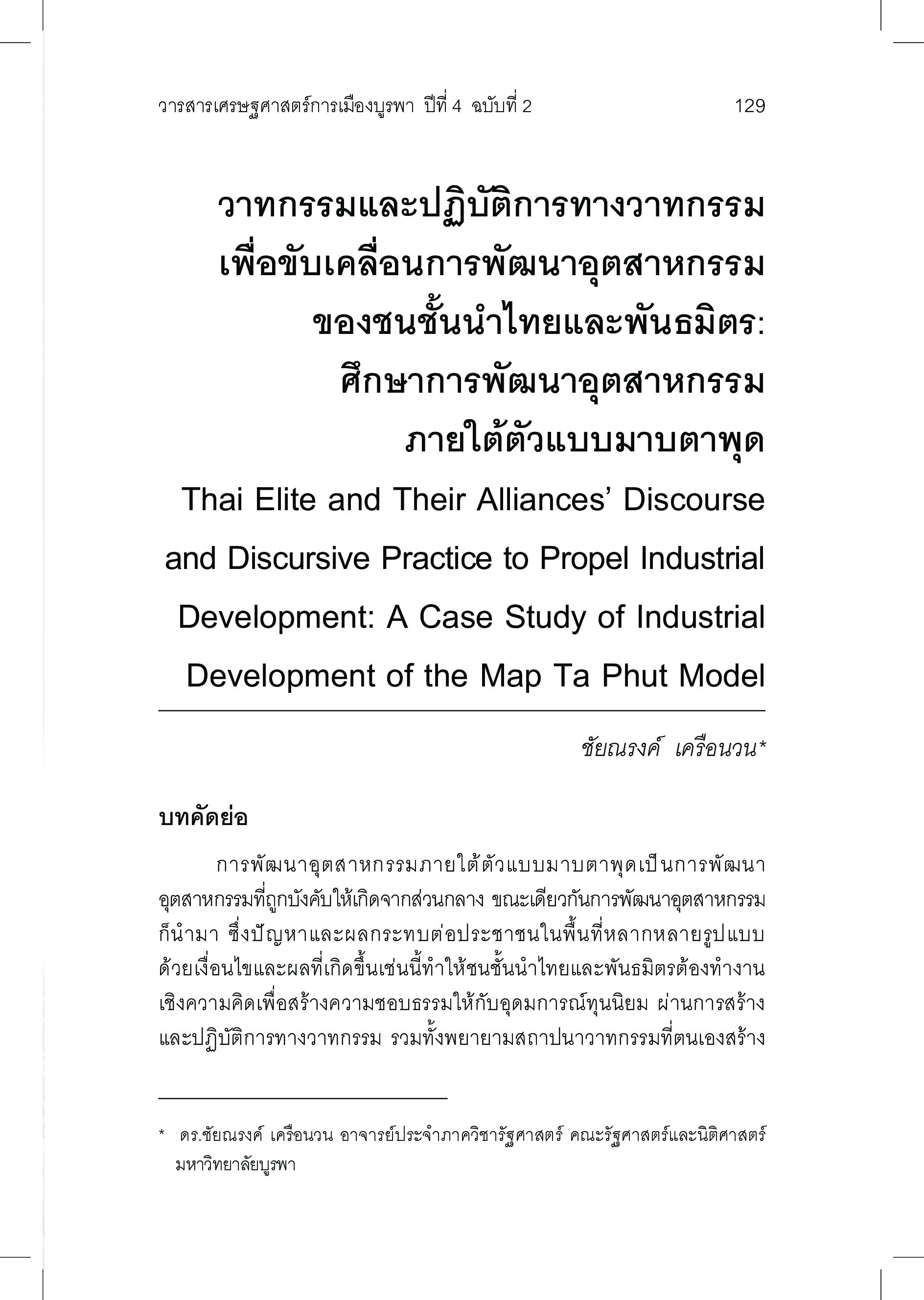Thai Elite and Their Alliances’ Discourse and Discursive Practice to Propel Industrial Development: A Case Study of Industrial Development of the Map Ta Phut Model
Keywords:
Discourse, Discursive Practice, Map Ta Phut ModelAbstract
Industrial development of the Map Ta Phut Model is a case of forced industrialization which causes problems and has various impacts on people in the area. The conditions and consequences of industrial development have made the elites and their alliances develop a concept to support legitimacy of the capitalism ideology through discursive formation and practices. They also try to make the discourse they have established a hegemonic discourse. The objectives of this process are to dominate, to subjugate and discriminate others, and to use the benefits of hegemony to constitute false consciousness by stimulating people to create some imagery in the industrial development process.
References
กาญจนา แก้วเทพ และสมสุข หินวิมาน. (2551). สายธารนักคิดทฤษฎีเศรษฐศาสตร์การเมืองกับสื่อสารศึกษา. กรุงเทพฯ: ภาพพิมพ์.
ชัยณรงค์ เครือนวน. (2558). ปฏิบัติการและการต่อสู้ทางวาทกรรมในการพัฒนาอุตสาหกรรม: ศึกษากรณีการพัฒนาอุตสาหกรรมภายใต้ตัวแบบมาบตาพุด. ดุษฎีนิพนธ์ปริญญารัฐศาสตรดุษฎีบัณฑิต, สาขาวิชาเศรษฐศาสตร์การเมืองและการบริหารจัดการ, คณะรัฐศาสตร์และนิติศาสตร์, มหาวิทยาลัยบูรพา.
ชัยยนต์ ประดิษฐศิลป์ และชัยณรงค์ เครือนวน. (2549). การจัดทำผังพิสัยการวิจัยระบบสุขภาพกับการพัฒนาอุตสาหกรรมในภาคตะวันออก. ชลบุรี: ศูนย์จัดการงานวิจัยระบบสุขภาพภาคตะวันออก (ศวรส.อ) มหาวิทยาลัยบูรพา, สถาบันวิจัยระบบสาธารณสุข (สวรส.).
ไชยรัตน์ เจริญสินโอฬาร. (2549). วาทกรรมการพัฒนา: อำนาจ ความรู้ ความจริง เอกลักษณ์และความเป็นอื่น = Development discourse. พิมพ์ครั้งที่ 4. กรุงเทพฯ: วิภาษา.
ธีรยุทธ บุญมี. (2551). มิเชล ฟูโกต์ = Michel Foucault. กรุงเทพฯ: วิภาษา.
ปรีชา เปี่ยมพงศ์สานต์. (2552). โครงสร้างอำนาจ การกระจุกตัวของความมั่งคั่งและความไม่เท่าเทียมกันทางสังคม ความคิดคำนึงทางแนวคิดทฤษฎี. เอกสารประกอบการบรรยายการวิจัยโครงสร้างอำนาจ วันที่ 12 พฤษภาคม 2552 ณ คณะเศรษฐศาสตร์ จุฬาลงกรมหาวิทยาลัย.
ผาสุก พงษ์ไพจิตร และคริส เบเคอร์. (2546). เศรษฐกิจการเมืองสมัยกรุงเทพ. พิมพ์ครั้งที่ 3. กรุงเทพฯ: ซิลด์เวอร์ม.
เสนาะ อูนากูล. (2531). ยุทธศาสตร์การพัฒนา: อดีต ปัจจุบัน อนาคต กองศึกษาและเผยแพร่การพัฒนา. กรุงเทพฯ: กองศึกษาและเผยแพร่การพัฒนา.
สำนักงานคณะกรรมการการพัฒนาเศรษฐกิจและสังคมแห่งชาติ. (2543). 5 ทศวรรษสภาพัฒน์. มปท.
_______. (2557) แผนพัฒนาเศรษฐกิจและสังคมแห่งชาติฉบับที่ 5 พ.ศ.2525-2529. วันที่ค้นข้อมูล 20 กุมภาพันธ์ 2550, เข้าถึงได้จาก http://www.nesdb.go.th/Default.aspx?tabid=62.
อานันท์ กาญจนพันธุ์. (2552). คิดอย่างมิเชล ฟูโกต์ คิดอย่างวิพากษ์ : จากวาทกรรมของอัตบุคคลถึงจุดเปลี่ยนของอัตตา. เชียงใหม่: สำนักพิมพ์มหาวิทยาลัยเชียงใหม่.
Domhoff, W. (2002). Who Rules America : power and politics. Fourth Edition. New York: McGraw-Hill.
Escobar, A. (1984-85). Discourse and Power in Development: Michel Foucault and the Relevance of His Work to the Third World. “Alternative X” (Winter).
Fairclough, N. & Wodak, R. (1997). ‘Critical Discourse Analysis‘. In: Introduction to Discourse Analysis. In van Dijk, T.A. (ed.). Discourse as social interaction. London: Sage.
Ferguson, J. (1994). The Anti-politics Machine: “Development,” Depoliticization, and Bureaucratic Power in Lesitho. Cambridge: Cambridge University Press.
Habermas, J. (1984) .Theory of Communicative Action Volume One: Reason and the Rationalization of Society. Translated by Thomas A. McCarthy. Boston: Beacon Press.
_______. (1984a). The theory of communicative action: Vol. 2, Lifeworld and system: A critique of functionalist reason. (T. McCarthy, Trans.). Boston: Beacon Press.
_______. (1996). Between Facts and Norms: Contributions to a Discourse Theory of Law and Democracy. Translated by William Rehg. Boston: The MIT Press.
Foucault, M. (1980). Power/Knowledge: Selected Interviews and Other Writing 1972-1977. New York: The Harvester Press.
รายชื่อผู้ให้สัมภาษณ์
บุญช่วย ชาวนาลุ่ม. (2552, 18 พฤศจิกายน). รองประธานชุมชนมาบชะลูด. สัมภาษณ์.
มานะ หอมสุวรรณ. (2552, 7 ธันวาคม). ประธานชุมชนบ้านล่าง. สัมภาษณ์.
สุชาติ กอเซ็ม. (2552, 2 ธันวาคม). ประธานชุมชนอิสลาม. สัมภาษณ์.






